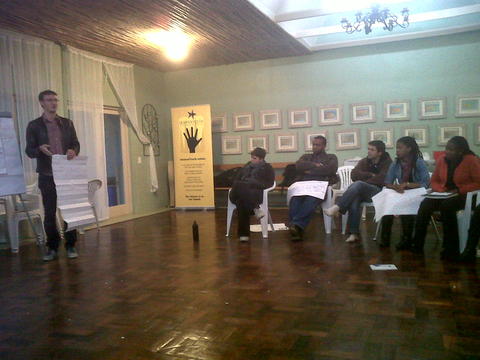
NSPW has been a whirlwind experience for this new Ikamvanite. Ten days ago I was in a job interview, and today I’m a part of the team that is shooting for a 100% pass rate for 100% of South Africa’s 2030 matric cohort. But that’s not the crazy part.
The crazy part is that I believe we can do it.
To get there, we’ll have to make some fundamental shifts in the way we understand
Ikamva. Over the next 17 years, we need to go from organisation to organism.
We need to infect South Africa with our belief, our energy, and our hope. After all,
whether you think you can, or whether you think you can’t – you’re right.
But to get to 2030 we first need to get through 2013. We spent the afternoon of
NSPW day 6 laying out Ikamva’s strategic priorities for 2013, figuring out how to
grow faster, do better, and learn more. Underlying all the key priorities we identified
were common themes of building stronger relationships, communicating better, and
sharing ownership of our success.
But even amidst all the excitement, we didn’t lose sight of the fact that we have
branches to run and admin to do. We need to keep proving that what we are already
doing really, really works. That means maintaining and improving our results at every
branch, every year, starting with 2013.
And 2030? Watch this space.


Day 5 of the NSPW (National Strategic Planning Week) shifted our focus a bit from the intensity of leadership and personal growth to a workshop that challenged our thinking. As an introduction this day started with a challenge to encourage us to identify “superpowers” that we each possess, these superpowers were the special gifts and talents that each of us possess and beneficial to the organisation. This led to the presentation and introduction to Strategy.

A lot of brainstorming took place to define strategy in groups, ideas and concepts were shared and it was evident that it wasn’t an unfamiliar concept but was interesting to share what different people thought it was. The facilitator challenged the group to identify what role each person had to get Ikamva Youth where it is now.
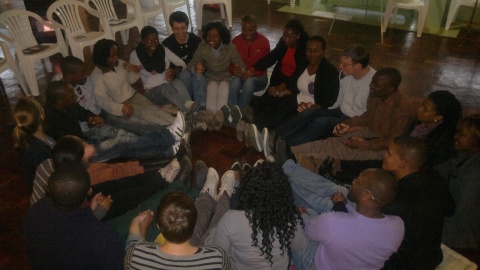
This gave rise to each Ikamva Youth branch giving presentations about individual branches around the country, which included: the history of the branch, the branches special projects, the branch committees and their functioning, projected targets from 2011 vs the target outcomes for 2012, tutoring and the financial projections for 2013. The day was concluded with a SWOT analysis to identify the stregnths, weaknesses, opportunities and potential threats for the organisation.
Although this was a shift of approach in terms of facilitation and content however, it was beneficial and stimulating for the mind to engage in organisational strategies for future growth and development.
We will continue to create magic!!!
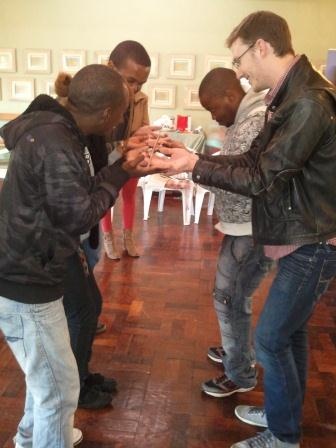
Developing high level of trust in between team members is a key component in guaranteeing a high standard of service delivery for the young people we are working with. Therefore today was dedicated to team tasks focusing on senses that a leader can expand its awareness of the people he/she is working with. Who could imagine that a simple garden stick can arouse and invite to discuss around those topics. I dare you… we did it!! The below picture is proof to that.

The second session makes us discover or revise the different kind of leadership which can be applied to different professional situations. It has been followed by a collective application. We learned how to be directive, democratic, affirmative, how to be humble, how to be visionary and how to produce other leaders.
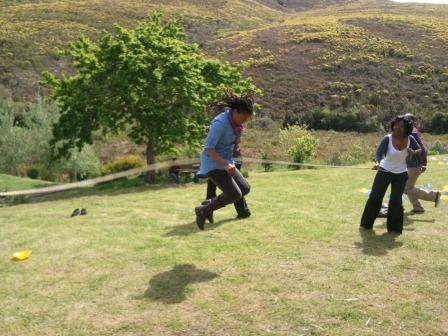
Frustration is also part of professional life and absolutely normal. It matters to identify the symptoms, and how to remedy from it. This feeling, which pollutes and reduces the human efficiency in interpersonal relationships, needs to be decontaminated as soon as possible.
To conclude the day, each and every staff discussed intensively on professional issues they are encountering within the organisation. No one gets shot. We succeed to do it in a climate of truth, respect and understanding.
We are looking forward tomorrow to give you more feedback.
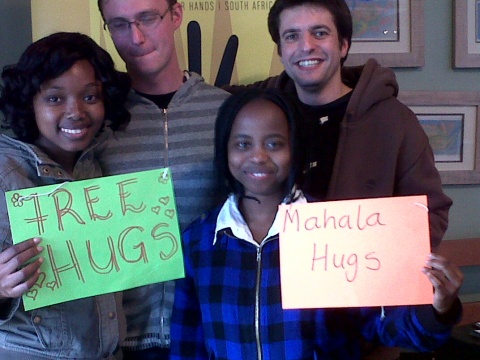
It is often said that there is a time for everything under the heavens. This is day number 4 at the IkamvaYouth National Strategic Planning Workshop. It has been a rollercoaster four days. At the heart of it all has been the dynamic; driven and extremely passionate Ilana…our trainer and coach. Today the focus was on coaching skills. The emphasis was on coaching being a very liberating tool when applied correctly. That people should learn to listen with their whole self; body; mind and heart. This is especially true for our learners who need to have their voices liberated. The coaching lessons are geared towards equipping us with the necessary skills to help our learners to open up and deal with their issues; when they need to.
The one on one sessions with group members gave us an opportunity to practise and also recognise areas that we need to work on. We need to make a conscious and concerted effort to be able to apply what we have learnt. This includes working on our body language; tone of voice and doing away with any preconceived ideas that we might have about particular situations affecting our learners.
The most important lesson we took away today is that when dealing with our learners we have to suspend our pasts; our current situations and be completely present…for them. We need to make sure that we do not put them in a situation where we project our views and feelings onto them; forcing them to see the world through the windows of our shattered souls; knowingly or unknowingly. What they need is for us to create the emotional as well as the physical spaces they need to be the best that they can be. They need us to create platforms where they can write their own life stories. There is no greater gift that we can give them; except; maybe; for the free hugs that were offered by the Ikamvanites this morning.


The biggest concern for all branches is mostly learner attendance, as it affects the learner’s academic progress. A common issue with all the branches is with the higher grades (mostly Grade11 and 12) as most of these learners have to attend compulsory after school classes at school which then affects the time that they spend at IkamvaYouth sessions. As IkamvaYouth we just have to find a way to ensure the learners stay motivated and keep attending the sessions being held.
The fire side chat helped immensely in terms of sharing ideas and engaging in ways on how to improve each branch with better learner attendance. Learner attendance is a major challenge for new branches, only because they still introducing themselves and finding their feet.

The amazing thing about IkamvaYouth is the relationship that we aim to form and flourish between learners, tutors, parents and schools and how that relationship helps to ensure that platinum attendance becomes a norm and learners improve in their learning abilities and academic progress.
So many things are involved in handling the learners such as report collection, database and attendance. As mentioned earlier we try by all means to involve schools and parents to assist us in such aspects to ensure that we are aware of learner improvements.
We generally believe that working with the schools will actually encourage the community and parents to be part of our movement. We clearly observed that intervening with the parents is rather helpful when it comes to things such as learners reporting that they will not be attending homework sessions for a certain day. Things like this are raised in parent meetings, another way to communicate with the community to inform them what plans, visions and strategies are in place and how we intend to go forth, impact and uplift the next generation and we intend to maintain consistency in producing better results and making sure that IkamvaYouth’s objective is recurring and achieved.
A lot of things arise in the discussions we have but their only for the better. Imposing changes in the new term will be something to look forward to but with intention to acknowledge that learner capacity is quite different but, learners getting mentors and having proper study schedule’s a way forward will be developed.









 Lloyd Lungu
Lloyd Lungu